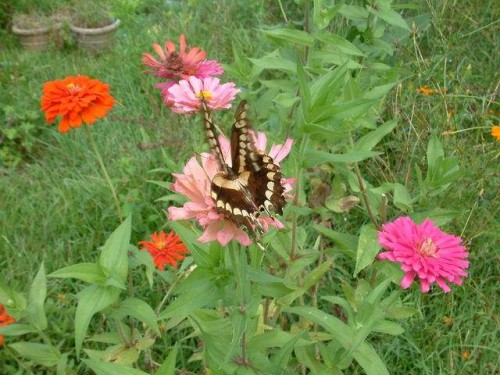|
SHRUBS AND FLOWERS
 In our study of trees, we have seen that the fruit trees represent wisdom of life of many useful kinds—concerning the Lord, the Church, marriage, social relations, benevolences, the care and education of children. The leaves of the trees represent perceptions of new truth; and the blossoms, all the parts of which are leaves modified by the expectation of fruit, represent the joyous perceptions of the application of wisdom to use. The flowering shrubs are many of them akin to the fruit trees, but lack their stately size, and their nutritious fruitfulness. They are content with beauty and fragrance, without more substantial fruits; or their fruits are only berries. In this they represent intelligence concerning various affections, which is enjoyed as a good in itself. It is intelligence rather about being good than about doing good; or if it does other good works, they are pleasant and kindly rather than substantial. In our study of trees, we have seen that the fruit trees represent wisdom of life of many useful kinds—concerning the Lord, the Church, marriage, social relations, benevolences, the care and education of children. The leaves of the trees represent perceptions of new truth; and the blossoms, all the parts of which are leaves modified by the expectation of fruit, represent the joyous perceptions of the application of wisdom to use. The flowering shrubs are many of them akin to the fruit trees, but lack their stately size, and their nutritious fruitfulness. They are content with beauty and fragrance, without more substantial fruits; or their fruits are only berries. In this they represent intelligence concerning various affections, which is enjoyed as a good in itself. It is intelligence rather about being good than about doing good; or if it does other good works, they are pleasant and kindly rather than substantial.
A large part of the intelligence in children’s minds is of this kind. They have not the mature reason to think out useful plans of life, or even to follow the details of such plans. But they love stories, especially such as illustrate clearly the good and the evil in human life. For such things their perceptions are quick. They are fond also of plays which imitate the works of maturer life—without their fullness of detail, but with a keen sense of their heroism, their self-sacrifice, their humility, their patience, and other virtues. This intelligence in virtue, if of a permanent kind, and with some development with years, agrees well with the nature of the flowering or fragrant shrubs.
The annual flowers, herbaceous and short lived, are like the oft-recurring promptings to be good, to be gentle, modest, patient, hopeful, cheerful, grateful, and so on in a long series, when the admonitions are heeded in a spirit of obedience to the Lord, or to the Lord’s representatives. It is not difficult to see in violets the beauty of a retiring modesty; in daisies, of humble cheerfulness; in lilies, of a more stately and serene hopefulness. The perception of such characteristics, as presented in the flowers, has always been an element in the art of the poets. Our Lord in speaking of “the lilies of the field,” probably did not refer to lilies in particular, for these are not conspicuous in Palestine; but used the term in a general sense for the flowers of the field. Beautiful flowers abound all over the land; and neither in color, in form, nor in texture, can any royal robes compare with them. This is not less true spiritually than naturally; for the flowers of the mind are spontaneous expressions of good feeling, and no elaborate array of artificial sentiment can compare in beauty with such as is spontaneous and genuine, and has in it life from the Lord.
Author: JOHN WORCESTER 1875
|